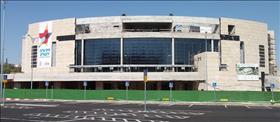Should we laugh or cry at reading Chief Rabbi Lau's words?
Chief Rabbinate perverting Sukkot with religious bigotry
Only one year ago, Chief Rabbi Lau self-righteously preached to the Pope, proclaiming Israel's greatness in protection of religious freedom, and now he himself aimed to curtail Christian prayer services in Jerusalem.
Uri Regev 06/10/2015 21:04
Tags: religious freedom · Chief Rabbinate · David Lau · Sukkot · International Christian Embassy Jerusalem

Jerusalem Arena, courtesy: Wikipedia
Just last year, the Israeli Chief Rabbis published a public statement, calling on the authorities to prevent a Christian prayer vigil organized by the International Christian Embassy Jerusalem (ICEJ) near the southern wall of the Temple Mount. This was preceded by a campaign run by rabbinic organization “Derech Emunah” (Path of Faith) that published its own appeal against the event. The vigil is part of the ICEJ’s annual Feast of Tabernacles celebration, a regular pilgrimage of thousands of Christians that has been going on for years.
Hiddush challenged this assault by the Rabbinate last year, turning to PM Netanyahu, Minister of Religious Affairs Naftali Bennett and Attorney General Yehudah Weinstein to intervene in their respective roles. Unfortunately, the authorities only played along with the Rabbinate, and forced the Christians to move their prayer location. Of course, this served as an invitation to repeat this assault on the Christian pilgrimage this year; and surely enough before Sukkot Chief Rabbi Lau along with the Chief Rabbis of Jerusalem took a lead role in an assault on the organizers and pressuring the Jerusalem municipal corporation that manages the Jerusalem Arena.
The rabbis attempted to force the city to renege on its contract with the Christian group and prevent the organizers from holding their prayer vigil. Last year, the Rabbinate focused its complaints on the "severity" of the prayer vigil's location near the Temple Mount, but in reality, the rabbis' opposition has nothing to do with location. Only animosity towards Christianity explains why the rabbis consistently oppose this annual Christian pilgrimage, regardless of where it is held.
Even if this Christian group did intend to spread their religious beliefs to non-Christians in an attempt to present the beauty and attraction of the Christian faith as they see it, that would not constitute grounds for limiting their religious liberties. This is a pillar of religious freedom, pure and simple.
The ICEJ issued a statement, declaring that they never engaged in missionizing, despite the Rabbinate's claims. They wrote that there was and is no missionary intention associated with this annual prayer vigil, which brings together 5,000 pilgrims from all over the world. The rabbis' inflammatory accusations are based on false claims.
Needless to say, Hiddush does not support missionary work, but it's important to understand that missionary work is not illegal in Israel, save for specific limitations (proselytizing to children and offering material benefits). Thus, even if this Christian group did intend to spread their religious beliefs to non-Christians in an attempt to present the beauty and attraction of the Christian faith as they see it, that would not constitute grounds for limiting their religious liberties. This is a pillar of religious freedom, pure and simple.
Therefore, Hiddush has once again turned to the authorities, stressing that it is critical for the Attorney General to instruct the Chief Rabbis and other functionaries and civil servants that it is illegal to curtail religious freedom (as much as they may dislike it). They too can present their truths, but may not silence other's truths. To better appreciate the serious nature of this matter, just imagine the public uproar should a leading Christian religious leader such as the Cardinal of New York attempt to pressure the municipal authorities to prohibit Chabad "mitzvah tanks!" or the Tefillin campaign in the streets of New York.
The irony of such religious bigotry on the Festival of Sukkot is glaring, for during Sukkot in the time of the Holy Temple, a unique sacrifice was offered on the altar—with a unique and beautiful intention:
The Torah (Numbers 29) describes a cumulative Festival sacrifice of seventy bulls on Sukkot. The Babylonian Talmud (Tractate Sukkah 55b) teaches that these seventy bulls were offered in the Temple for the seventy nations of the world. Here we can sense that inherent within the very nature of the Festival of Sukkot is an inexorable bond, linking it to the earth's peoples. Sukkot was designed to be a holiday for all the world, but today's Israeli Chief Rabbinate perverts its message with untenable religious bigotry. It remains to be seen whether the authorities will take on this example of intolerance and hate speech stemming from Israel’s highest Rabbinic establishment.